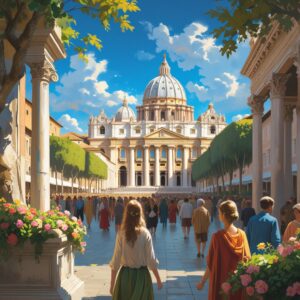Prior to his formal papal election being announced from the Basilica’s balcony, excited spectators below cheered and sang, “Viva il Papa”—Long live the Pope—expecting the arrival of the next shepherd of the Catholic flock. At 69 years old, Robert Francis Prevost has risen to become the 267th pope, choosing the name Leo XIV for his papal reign.
This historic appointment marks the first time an American has assumed the papacy, though Prevost’s extensive years as a missionary in Peru have also long associated him with Latin American ecclesiastical circles. Born in Chicago in 1955 to parents of Spanish and Franco-Italian heritage, he began his faith journey as an altar boy and was ordained to the priesthood in 1982. In 1985, he moved to Peru, where he dedicated several years to serving and engaging with local communities. But he never severed his linkage entirely with the United States, where he would regularly return as a pastor and religious leader in his home territory.
 Prevost is a Peruvian citizen. He is loved for his service to the underprivileged and for bridging ecumenical gaps. His ten years of service as a parish priest and seminary teacher in the northwestern region of Trujillo, Peru, emphasize this grassroots commitment.
Prevost is a Peruvian citizen. He is loved for his service to the underprivileged and for bridging ecumenical gaps. His ten years of service as a parish priest and seminary teacher in the northwestern region of Trujillo, Peru, emphasize this grassroots commitment.
During his first remarks as pope, Leo XIV warmly honored his predecessor, Pope Francis, reflecting on the “brave yet compassionate” nature of the pontiff whose blessings had inspired their gatherings. “United and guided by God, let us move forward together,” he proclaimed amid enthusiastic applause. He acknowledged his roots in the Augustinian Order, emphasizing his spiritual foundations.
In 2014, Father Prevost was appointed Bishop of Chiclayo, Peru, by Pope Francis. His influence expanded greatly when, as Prefect of the Dicastery for Bishops in Latin America, he took on the vital role of selecting and supervising bishops throughout the region. After being elevated to archbishop in January 2023, his rapid progression culminated with Pope Francis designating him as a cardinal, setting the stage for his future leadership as pope.
What Are Pope Leo XIV’s Views?
Much of the early scrutiny surrounding Leo XIV will focus on whether he continues Pope Francis’s reforms and progressive stance on key social issues. There is a consensus among observers that Prevost aligns with Pope Francis’s views on welcoming migrants, aiding the poor, and environmental stewardship.
Those who know him well portray him as approachable, practical, and passionately dedicated to advocating for social justice. During interviews, the Prevost openly discussed his immigrant heritage—his grandparents hail from France and Spain—and his upbringing in a devout Catholic family that was heavily involved in parish life.
While born in the United States, the Vatican recognizes him as only the second pope from the Americas, following Pope Francis himself from Argentina. His tenure in Peru coincided with crises related to church sexual abuse scandals. While his diocese has vehemently denied any involvement in cover-ups, such controversies remain sensitive issues in his legacy.
Selecting the name Leo is a deliberate act, symbolizing a deep commitment to addressing critical social issues. Historically, the name is associated with bold stands—Pope Leo I (Leo the Great) demonstrated remarkable courage when he confronted Attila the Hun, while Pope Leo XIII (1878–1903) is most recognized for his advocacy for workers’ rights amidst the tumult of the early Industrial Revolution. Experts suggest that Prevost’s selection of Leo’s name underscores his commitment to social justice and defending the marginalized.
Potential shifts in the Church’s stance on LGBT issues will be watched closely. While some believe Leo XIV may adopt a more conservative approach than Pope Francis, he has expressed cautious support for Francis’s directives to permit blessings for same-sex couples and those in “irregular situations,” emphasizing that bishops should interpret such guidelines within local cultural contexts.
Regarding environmental issues, Prevost has advocated for concrete action and envisions a giving-in-kind bond between mankind and the earth. He has backed Vatican undertakings such as the installation of solar panels and the use of electric vehicles, thus taking an active stand against climate change.
Pope Leo XIV has shown backing for greater gender equality within Vatican leadership, echoing Pope Francis’s initiative to include women in the workings of the Dicastery for Bishops. He has stated that the perspective of women adds a special enrichment in discernment for episcopal appointments.
Robert Prevost’s papacy as Leo XIV offers a marriage of tradition and candid modern engagement, social justice, environmental sustainability, and all-encompassing leadership. It is within his leadership that the future trajectory of the Catholic Church will certainly be shaped.